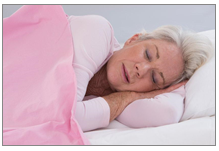
Seven Sleep Strategies for Seniors
Insomnia is a common concern among the older adult population. One study reports that the overall prevalence of insomnia symptoms ranges from 30 percent to 48 percent in older adults. Apart from disrupted sleep, insomnia can lead to other health issues, such as anxiety, depression, inflammation, obesity, diabetes, and stroke.
Despite the common myth that older adults need less sleep than younger population groups, sleep is just as important for seniors. The National Sleep Foundation recommends that adults over the age of 65 aim to get between seven and eight hours of sleep each night. If you’re an older adult who is struggling to get adequate sleep, here are seven sleep strategies to help you fall asleep and stay asleep all night long.
Create a Sleep-Inducing Environment
Creating an environment conducive for sleeping will help you fall asleep more quickly and stay asleep all night long. Remove items from your room that hinder sleep, such as a television. Install black out curtains to help darken the room. Use low-wattage bulbs or amber lights to negate the effects of artificial lights at night. Diffuse lavender to promote slow-wave sleep. Use a sound machine to block out noises that might interfere with sleep.
Put Electronics to Bed
Studies show that the blue light our devices emit interfere with our natural sleep cycles, including older adults. Establish a habit of putting all electronic devices away at least one hour before bedtime. If you prefer to read from a tablet device, adjust the settings to night mode.
Unwind with Bedtime Yoga
The aim of restorative yoga is to help you relax and self-soothe. It’s perfect for seniors and can be practiced in bed. Learn a few poses to incorporate into your bedtime routine, and you’ll soon be drifting to sleep peacefully.
Establish a Bedtime Routine
Routine bedtime rituals can send signals to your mind and body that it’s time to sleep. Establish a few rituals to help your mind and body unwind before bed. Take a warm bath, listen to relaxing music, sip a cup of calming tea, or read a book in a comfortable chair. Brush your teeth and change into pajamas before hopping into bed.
Maintain a Consistent Bedtime
In addition to establishing a bedtime routine, it’s important for seniors to maintain a consistent bedtime. Waking up and going to bed around the same time each day helps older adults fall asleep faster and stay asleep longer. Set your bedtime to when you actually feel tired. Then, think through your bedtime routine and start your rituals so that you have enough time to complete them before going to bed.
Eliminate Caffeine After Lunch
Caffeine has a disruptive effect on sleep. It can make it harder for older adults to fall asleep and reduce overall total sleep time. Older adults can become more sensitive to caffeine as they age. In order to prevent caffeine from interfering with a good night’s sleep, it’s best for older adults to eliminate caffeine after lunch. This gives caffeine plenty of time to be eliminated from your system.
Avoid Late Afternoon Naps
While it’s tempting to doze off in the afternoon, late afternoon naps can compromise your sleep. As much as possible, avoid falling asleep for a short rest in the later afternoon hours. If you feel tired, get outside, go for a walk, get up off the couch and move your body. If you’ve developed the habit of an afternoon nap, aim to take a rest in the early afternoon hours and limit it to 20 minutes.
Some seniors have trouble falling asleep and staying asleep due to anxiety. They may be concerned about being able to manage everyday tasks alone or fear becoming a burden to their family. If you’re a senior who is struggling to get a good night’s sleep, Visiting Angels Beaver Dam is here to help. We provide experienced care to seniors who need assistance to remain independent and safe in their own homes. Our compassionate caregivers can help you unwind and relax in the evening, setting you up for a successful night’s rest. The senior home care services provided by Visiting Angels can give you peace of mind and promote better sleep, starting today. Simply contact us by calling 920-821-1111 to learn more.
